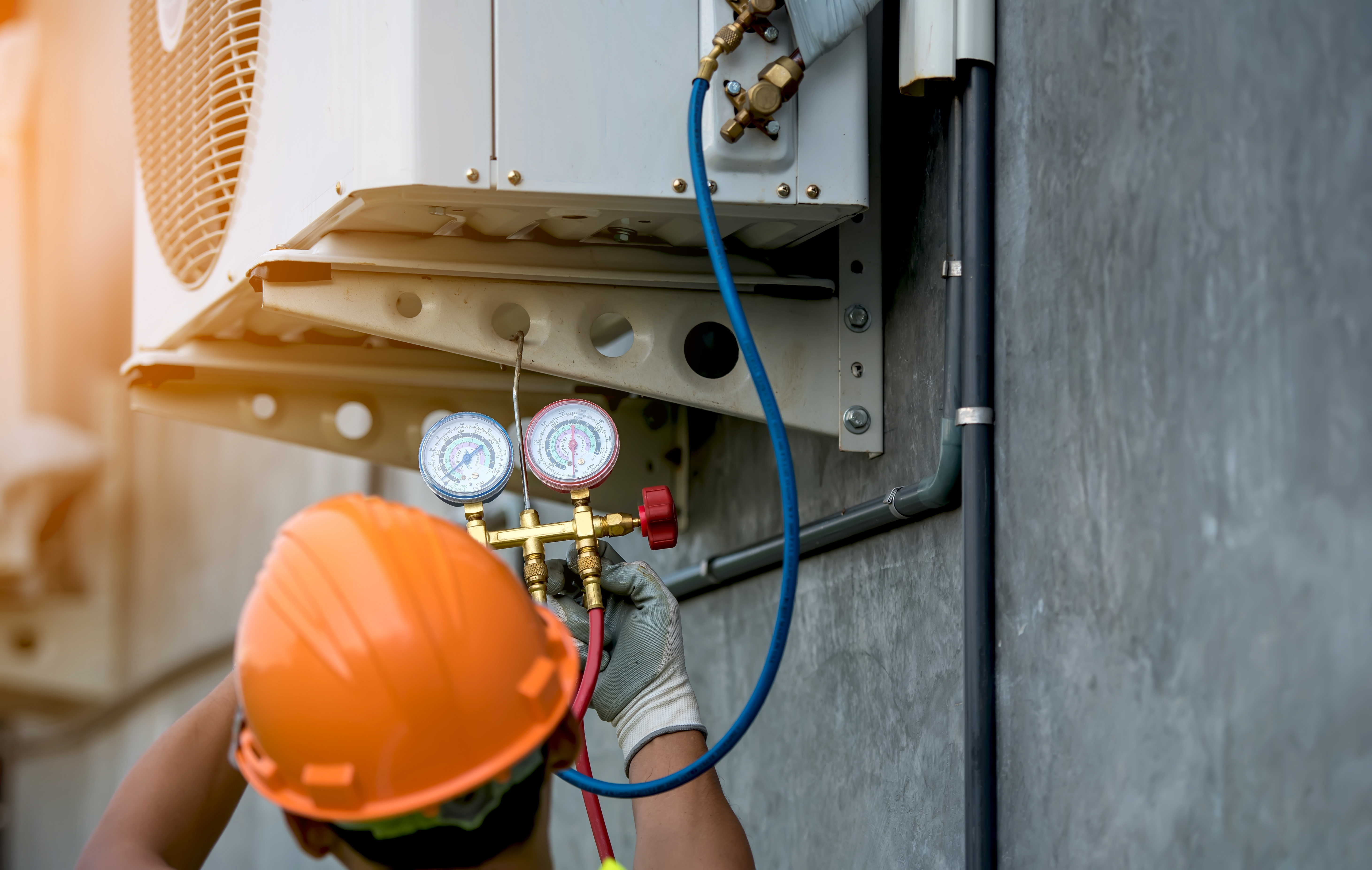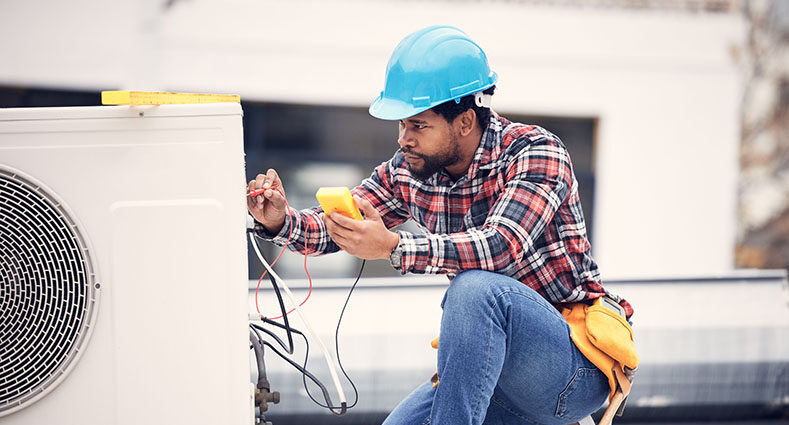Fix broken Air conditioner or replace it? Expert advice explained
Everything about A/c: Identifying Common Issues and Effective A/c Repair Techniques
Heating and cooling systems are vital for preserving indoor comfort. Recognizing their parts and capability is necessary for identifying usual concerns. House owners usually deal with issues such as ineffective air conditioning, weird smells, or climbing energy costs. These indicators can show underlying problems that might need attention. Discovering do it yourself troubleshooting methods can be advantageous, yet understanding when to seek specialist aid is equally essential. What actions can be required to ensure lasting performance?
Comprehending Your Heating And Cooling System: Parts and Functionality
A heating and cooling system, frequently taken into consideration the backbone of interior climate control, is composed of numerous vital elements that interact to control temperature level and air high quality. The key aspects consist of the heating device, ventilation system, and a/c device. The home heating system, commonly a heater or boiler, generates heat throughout chillier months, while the air conditioning device cools interior spaces throughout the summertime.

Common A/c Issues Home Owners Encounter
Homeowners often face a number of typical heating and cooling problems, consisting of irregular temperature level distribution throughout their space. In addition, unusual sounds throughout procedure can suggest underlying issues that require focus. Addressing these concerns without delay is necessary for maintaining ideal system performance.
Inconsistent Temperature Level Circulation
Many houses experience the frustrating concern of irregular temperature level circulation, where specific areas really feel uncomfortably cozy while others continue to be also cold. This trouble usually emerges from a variety of aspects, consisting of inadequate insulation, obstructed vents, or an improperly sized a/c system. When air ducts are not adequately sealed or when furniture obstructs airflow, some spaces may get insufficient cooling. Furthermore, thermostat positioning can greatly influence temperature regulation; a thermostat located in a sunlit area may misrepresent the general temperature of your home. Routine upkeep, consisting of cleansing filters and making certain ductwork is clear, can help reduce these inconsistencies. House owners might likewise take into consideration zoning systems to far better control temperature levels throughout various locations of the home, advertising a much more comfortable living environment.
Unusual Sounds Throughout Procedure
When a HVAC system runs, uncommon sounds can suggest underlying problems that require attention. Homeowners may encounter a variety of sounds, such as grinding, squealing, or hissing. Grinding noises typically signify damaged bearings or elements, while squealing can recommend loosened belts or parts needing lubrication. Hissing might show a refrigerant leakage, which can jeopardize the system's efficiency. In addition, banging audios could direct to loose ductwork or an issue with the blower fan. Each of these sounds functions as a caution, triggering house owners to investigate better. Neglecting these signs can bring about more significant troubles and costly fixings. Routine upkeep and timely focus to unusual sounds can enhance system durability and performance, making certain a comfortable living setting.
Signs That Indicate Your Air Conditioner Needs Repair Service
How can one inform if their a/c system is in need of fixing? A number of indicators may suggest underlying concerns requiring expert focus. First, if the a/c fails to cool the room effectively, it may suggest a cooling agent leakage or compressor breakdown. In addition, an increase in power bills without corresponding use changes can signify inefficiency in the system. House owners need to also look out to unusual scents emanating from the device, which might suggest mold development or electric concerns. Moreover, if the a/c regularly cycles on and off, it could be an indication of a faulty thermostat or other mechanical problems. The existence of water pooling around the system can suggest a stopped up drain line. Recognizing these signs early can save time and money, making certain that the cooling system runs effectively and successfully.
Do It Yourself Troubleshooting Techniques for Cooling And Heating Issues
When encountering a/c concerns, home owners can utilize a number of DIY troubleshooting techniques to recognize the trouble. Secret methods include examining thermostat setups, checking air filters, and examining drain problems. These steps can assist pinpoint common breakdowns prior to seeking professional aid.
Examining Thermostat Settings
What steps should home owners require to assure their thermostat settings are correct? They must confirm the thermostat is set to the wanted temperature and setting, whether heating or air conditioning. Inspecting for a clear display and validating the from this source thermostat is not set to "hold" or "trip" mode is important. Homeowners must also confirm that the thermostat is level and set up in a location devoid of drafts, straight sunlight, or various other temperature level influences. Furthermore, recalibrating the thermostat can aid offer exact analyses. If the thermostat runs on batteries, replacing them might solve any concerns. By systematically evaluating these aspects, house owners can usually identify and rectify thermostat-related issues, advertising suitable HVAC system efficiency.
Inspecting Air Filters
Air filters play a crucial role in preserving optimal cooling and heating efficiency. They catch dust, allergens, and various other fragments, ensuring clean air circulation. Gradually, filters can come to be blocked, decreasing airflow and efficiency. To check air filters, individuals must initially situate the filter, often found in the return air duct or near the furnace. Once situated, they need to review the filter's problem-- if it shows up dirty or discolored, it most likely demands substitute. A lot of filters need altering every 1-3 months, relying on use and ecological aspects. Routine assessment and prompt substitute of air filters not only improve air high quality but additionally lengthen the life expectancy of cooling and heating systems, protecting against prospective malfunctions and costly repair work.
Assessing Drainage Issues
Just how can home owners properly identify and address water drainage more helpful hints concerns within their a/c systems? First, they should evaluate the condensate drainpipe line for clogs or blockages, which can lead to water buildup. Property owners may utilize a wet/dry vacuum to get rid of any type of debris obstructing the line. Next, checking the drainpipe pan for rust or leakages is necessary, as a damaged pan can create water to overflow. Routine cleansing of the drainpipe line with a mix of vinegar and water helps stop future clogs. Furthermore, ensuring appropriate slope of the drain line advertises effective water flow. If these do it yourself techniques do not fix the issue, getting in touch with a professional a/c technician might be essential to avoid possible water damage and system failing.
When to Call a Professional for Air Conditioning Fixings

While some air conditioner issues can be dealt with with do it yourself techniques, there are circumstances where calling a professional comes to be important. Home owners need to seek expert aid when they run into consistent issues, such as inadequate cooling, unusual sounds, or uncommon odors rising from the system. These signs may indicate deeper problems that require specialized expertise and tools to detect and repair correctly.

Preventative Upkeep Tips for Cooling And Heating Durability
Normal preventative upkeep can greatly boost the durability of heating and cooling systems. Home owners ought to schedule annual evaluations by licensed specialists to analyze system efficiency and identify prospective problems. Routinely altering or cleaning up air filters is vital, as this warranties correct air flow and minimizes stress on the system. In enhancement, examining and securing ductwork stops energy loss and enhances general performance.
It is also recommended to keep the exterior device free from particles and plants, enabling peak airflow and warmth exchange. Home owners must inspect the condensate drainpipe for clogs to prevent water damage and mold and mildew growth. Preserving appropriate thermostat setups and utilizing programmable alternatives can boost energy efficiency. Recording maintenance tasks helps track service background and can assist in determining reoccuring concerns. By following these preventative procedures, individuals can make best use of the performance and life expectancy of their HVAC systems
Frequently Asked Inquiries
How Typically Should I Replace My A/c System Filters?
HVAC system filters should typically be changed every one to 3 months, depending on usage, filter kind, and ecological elements. Routine substitute assists preserve effectiveness and air high quality, guaranteeing peak system efficiency throughout the year.
What Size A/c System Do I Need for My Home?
To figure out the suitable HVAC system size for a home, one should think about square video footage, insulation high quality, and local climate. Consulting a professional can aid ensure maximum efficiency and convenience for the certain living area.
Are There Eco-Friendly Cooling And Heating Options Available?
Yes, green cooling and heating alternatives are readily available, consisting of energy-efficient warmth pumps, solar-powered systems, and geothermal home heating. These choices lower power intake and ecological effect, promoting sustainability while maintaining effective environment control for household and business areas.
Exactly How Can I Enhance My heating and cooling System's Power Performance?
To enhance cooling and heating energy performance, one can routinely maintain the system, seal air leaks, install programmable thermostats, use energy-efficient filters, and warranty adequate insulation throughout the home to decrease power intake and improve performance.

What Is the Ordinary Life-span of a HVAC System?
The average lifespan of a HVAC system usually ranges from 15 to 25 years, depending upon elements such as maintenance, usage, and the top quality of installment. Normal maintenance can considerably prolong its operational longevity.
Conclusion
In recap, a thorough understanding of HVAC systems encourages home owners to determine typical problems and address small troubles properly. Recognizing signs of malfunction, employing DIY fixing techniques, and focusing on routine maintenance air conditioning installation can boost system efficiency and efficiency. However, when confronted with complicated repairs, getting expert help is critical to ensure safety and long life. By cultivating understanding and proactive care, individuals can delight in a comfortable interior atmosphere while lessening unexpected costs related to a/c failings.